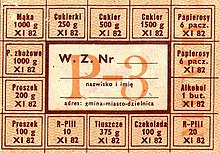Martial law in Poland: Difference between revisions
No edit summary |
rv inexplicable |
||
| Line 9: | Line 9: | ||
==Summary== |
==Summary== |
||
The phrase in [[Polish language|Polish]] is "Stan Wojenny", which translates |
The phrase in [[Polish language|Polish]] is "Stan Wojenny", which translates loosely as "state of war". The country remained at [[peace]] for the duration, however democratic movements (such as [[Solidarity]]) were banned and their leaders, including [[Lech Wałęsa]], imprisoned. The institution of martial law is believed to be responsible for a number of deaths. Those responsible claim about a dozen fatalities, while a parliamentary commission from 1989-1991 arrived at a figure of more than 90 deaths[http://wiadomosci.gazeta.pl/wiadomosci/1,55670,3250318.html]. |
||
==Martial law== |
==Martial law== |
||
Revision as of 17:47, 6 June 2007

The period of martial law in Poland refers to the period of time from December 13, 1981 to July 22, 1983 when the government of the People's Republic of Poland drastically restricted normal life.
Summary
The phrase in Polish is "Stan Wojenny", which translates loosely as "state of war". The country remained at peace for the duration, however democratic movements (such as Solidarity) were banned and their leaders, including Lech Wałęsa, imprisoned. The institution of martial law is believed to be responsible for a number of deaths. Those responsible claim about a dozen fatalities, while a parliamentary commission from 1989-1991 arrived at a figure of more than 90 deaths[1].
Martial law
As part of the crackdown, media and educational institutions underwent "verification", a process that tested each employee's attitude towards the regime and Solidarity. More than 2,000 people lost their jobs. Solidarity was banned. Its leaders were arrested overnight. Full censorship and a six-day working week were re-imposed. The coal mines were placed under military control and military courts were established to set long jail sentences for those spreading "false information"[2].
Long-term effects
Even after martial law was lifted, a number of restrictions remained in place for several years that drastically reduced the civil liberties of people living in Poland. Martial law also had severe economic consequences: the members of the government instituted major price hikes (calling them economic reforms), as a result of these hikes, the income of the population fell in real terms by approximately 20%, with some estimates being much higher[3].
After 1989
After the downfall of Communism in Poland in 1989, members of a parliamentary commission determined that martial law had been imposed in clear violation of the country's constitution which had authorized the executive to declare martial law only between parliamentary sessions (at other times the decision was to be taken by the Sejm (parliament). However, the Sejm had been in session at the time when martial law was instituted. In 1992 the Sejm declared that the imposition of martial law in 1981 violated the law [4].
See also
- Kopalnia Wujek (the Wujek Mine massacre)
- Military Council of National Salvation
- History of Poland - The end of Communist rule
